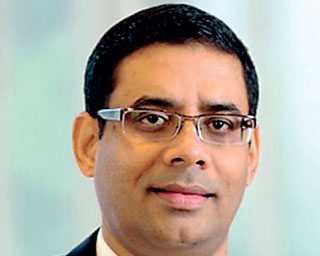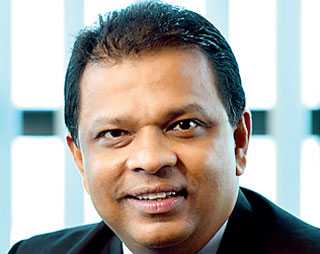Friday Feb 27, 2026
Friday Feb 27, 2026
Tuesday, 26 February 2019 00:36 - - {{hitsCtrl.values.hits}}
HNB Group has recorded a Profit Before Tax of Rs. 26.5 billion and a Profit After Tax of Rs. 19.1 billion, posting a year-on-year (YOY) growth of 14.6% and 14.4%, respectively, for the year ended 2018 in a clear demonstration of the resilience of the Group’s robust business model despite an array of challenges faced by the industry.
 |
Chairman Dinesh Weerakkody |
 |
Managing Director/ CEO Jonathan Alles |
HNB said in a statement that driven by sound loan book growth and improved margins, Interest Income at the Bank grew by 12.4% YOY to Rs. 108.1 billion. Interest Expenses increased at a slower 7.1% YOY on account of zealous mobilisation of low cost CASA deposits. In the backdrop of an industry decline in the CASA ratio, this is an improvement of 11.1% during the 12-month period. The resultant Net Interest Income (NII) grew by 20% YOY to Rs. 47.6 billion.
The Bank’s Net Fee and Commission Income rose by 13.1% over 2017 to Rs. 9.4 billion from strong growth in Commission Income from trade finance, credit cards and remittances, supported by fees from digital banking, cash management and custodial services.
HNB Chairman Dinesh Weerakkody stated: “I’m pleased to note the overall performance of the Group reinforcing our group position in the market, and I extend my gratitude to all our stakeholders for the trust placed in us and the support to navigate through very challenging economic and regulatory headwinds.” He added: “As we have always been, we stay committed to helping people and businesses prosper in enhancing the quality of life in Sri Lanka.”
The industry witnessed the Non-Performing Advances ratio deteriorating by approx. 100 bps during the year and the Bank successfully managed its NPA ratio at 2.78% as at end of the year. The individual impairment for the year decreased by 10.4% to Rs. 3.9 billion. The collective and other impairment charges amounted to Rs. 5.4 billion for the year – 65% of this amount was the impact of the adoption of SLFRS 9 standard with effect from 1 January 2018.
The multi-pronged centralisation and efficiency initiatives pursued by HNB continued to yield dividends with the Cost-to-Income ratio improving by 300 bps to 36.4% whilst this impact was also mirrored in the Group Cost-to-Income ratio of 43.0% - an improvement of over 400 bps.
The Group reported an Operating Profit prior to taxes and levies of Rs. 33 billion, a considerable 16.4% YOY growth over the Rs. 28.4 billion achieved in the previous year. The Bank’s Operating Profit amounted to Rs. 29.3 billion, which is a growth of 8.3% YOY.
The Bank’s PBT grew by 4.1% YOY to Rs. 23 billion. The introduction of Debt Repayment Levy, effective from the fourth quarter of 2018, resulted in an increase in the total FSVAT for the bank rising by 26.8% relative to the previous year. The new Inland Revenue Act mandating the abolishment of tax exemptions on specified investments also lead to an increase of 33.1% in the income tax charge for the Bank. The resultant total tax charge for the year to the Bank amounted to Rs. 13.8 billion with the PAT for the Bank at Rs. 15.5 billion for the year 2018.
Group PAT generated a Return on Assets (ROA) and Return on Equity (ROE) of 1.6% and 14%, respectively.
Commenting on the 2018 performance, HNB MD/CEO Jonathan Alles stated: “The year 2018 posed challenges to the banking sector on many fronts. The stressed market conditions and significant debt collection challenges resulted in a decline in asset quality industry-wide, whilst the requirement to adopt SLFRS 9 reporting standards further exacerbated this position, requiring higher impairment charges. The recent downgrade of the sovereign rating has increased the borrowing cost and triggered further impairment of investments in foreign currency government securities held by the sector.
Disproportionately excessive taxes imposed through the new Inland Revenue Act, including the ad hoc Debt Repayment Levy, has had a significant impact on the profitability resulting in a significant capital erosion in the industry at a time when the more stringent Basel III regulations requiring more capital is being rolled out. The total capital adequacy requirement increased from 10% at 30 June 2017 to 14% with effect from 1 January.
Alles further commented: “We see these challenges continuing to affect the growth of the banking sector. HNB presently is in an exciting phase of growth and transformation. We are in the process of driving quantum changes in our systems, processes and digital offerings, which will significantly enrich the experience we deliver to our loyal clientele across the country, and we are also focusing on delivering an enhanced employee experience to our dedicated team through a refined value proposition.”
The sound loan book growth represented a 18.8% YOY increase in Bank’s Advances to Rs. 772 billion while the deposit base expanded by 14% YOY to reach the Rs. 800 billion mark. Total Assets grew by 13.8% YOY to Rs. 1.1 trillion.
HNB Assurance, the Group’s insurance arm, performed well during 2018 to lead the performance of the subsidiaries. Acuity Partners, the investment banking business, and HNB Finance also performed strongly in their respective business spaces despite the effects of the non-conducive business climate being felt across spheres. The Group Gross Loan Book grew by 19.2% YOY to Rs. 795 billion and was supported by the Consolidated Deposit Base growing by nearly Rs. 100 billion during the 12 months to Rs. 818 billion. The Group’s Asset Base increased by 14.0% YOY to Rs. 1,148.6 billion (Rs. 1.15 trillion).
Notwithstanding the SLFRS 9 impact on reserves, the Bank and Group remains well-capitalised even under the more stringent BASEL III regulations. Tier I Capital was reported at 12.80% for the Bank and 13.16% for the Group while Total Capital Ratio amounted to 15.22% and 15.41% for the Bank and Group, respectively.
Alles added: “I would like to place on record my heartfelt gratitude to the entire team of the HNB Group for delivering a steady performance in a stressed environment, and for fully embracing the transformational journey that we have embarked on”.
In 2018, HNB was placed first in several diverse banking awarding forums, including Retail, Forex, Payments, Cash Management, SME Banking, Digital Banking, Sustainable Reporting and Islamic Finance. The Bank was also recognised as the ‘Best private sector organisation for promoting women in the workplace’ at the Women in Management, Top 50 Professional and Career Women Awards 2018.
HNB is the first local bank in Sri Lanka to receive an international rating on par with the sovereign from Moody’s Investor Services while maintaining a national long term rating of AA - (lka) from Fitch Ratings.
In 2018, HNB had the distinction of becoming the No. 1 bank in Sri Lanka in the Top 1000 World Banks 2018 ranked by the ‘The Banker’ magazine of the UK and the No. 1 bank in ‘Business Today’ rankings for 2017/18.